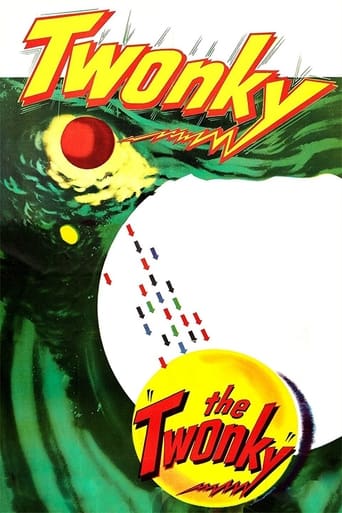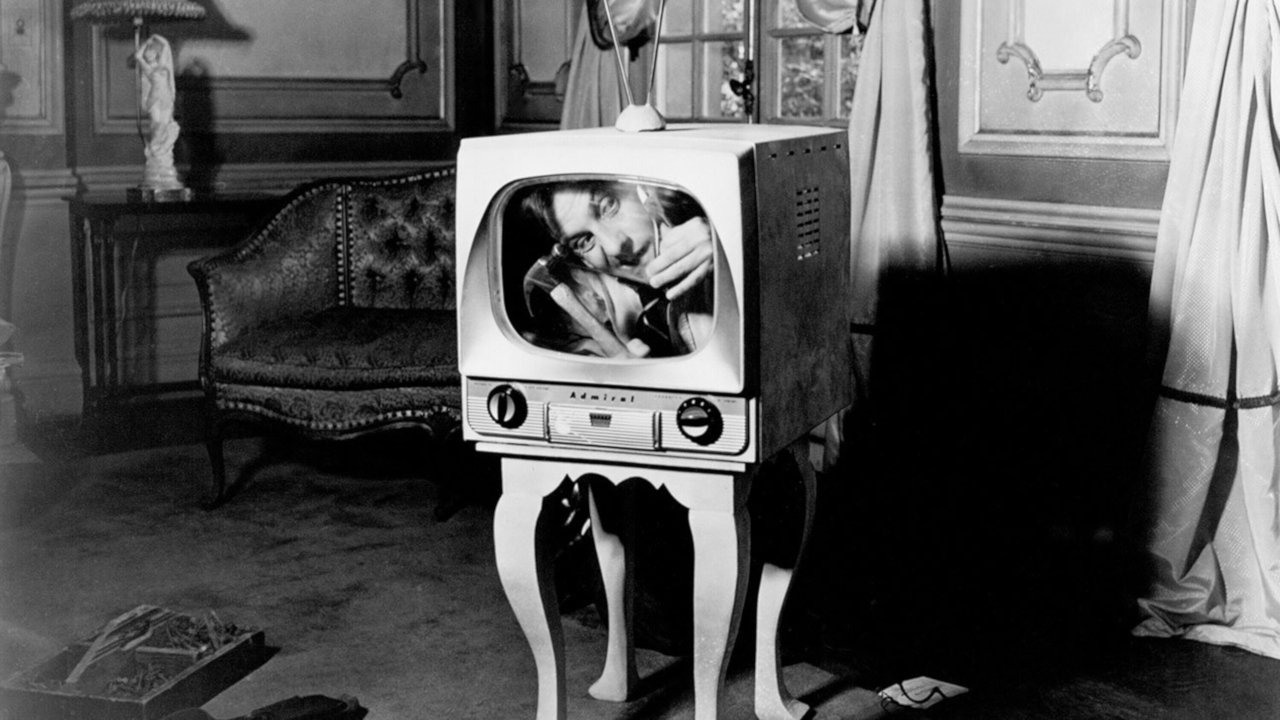flapdoodle64
This film is a pleasant waste of time, with a reasonably clever script and good performances by Hans Conried and the slightly drunken guy who played the coach. There are a few surprising double-entendres that I did not expect, which contribute to an understated subversive message to this film.For those that watch scifi movies expecting rocketships, monsters, FX, and explosions, this film will be a disappointment. As far as spectacle goes, this could easily be a radio or television play. As far as scifi-satire, this is pretty decent stuff and certainly one of the first cinematic examples of it. It's interesting to note that this film premiered in 1953, the same year as Bradbury's 'Fahrenheit 451,' which also satirized TV.There is a walking TV set in this film, which is named 'the Twonky,' by the drunken coach, and this special effect is achieved by a primitive puppet of some sort...surprisingly, this effect works well from both a story-telling and mood point of view.The basic concept here is that a piece of entertainment technology, in the name of being helpful, comes to take over and tyrannize the life of Hans Conried. My reaction, seeing this film for the first time in the year 2012, is that the writer essentially prophesied the Iphone and 'Android', and every similar 'personal electronic device' which now seems indispensable to us.
oscar-35
*Spoiler/plot- 1952, The Twonky, A man receives a TV set from his loving wife to keep him happy while she is out of the house. The TV set is really am alien from another planet and future time who is studying the human race's passions and problems. At first, it's fun. The man calls it, "A twonky". His name for a unexplainable, all powerful manipulator in his household life. The Twonky becomes more and more protective and restrictive for the man's likes and dislikes. But sadly, the twonky wins out in the end.*Special Stars- Han Conreid as the husband. Arch Oboler as this satire's producer, writer, and director.*Theme- The idiot tube will rob you of your individual life.*Based on- The Golem tale.*Trivia/location/goofs- This satire film was the ironic basis of many TV shows to follow like Twilight Zone, One Step Beyond, Karloff's The Veil, and Outer Limits. This interesting film was aired on Conried's birthday on TCM many years ago. Am interesting satire like Hans Conried's film, "The 5000 Fingers of Dr T".*Emotion- This was a frightening movie for your TV watchers to see and think about. 50's TV watcher's parents had voiced opposition to over watching so much TV, voiced in that new TV centric era. Some director decided to take those parental views and mix it into the scifi high suspense and drama of 'The Twonky'. The film makes some good points about human behavior and the use of TV in our society. Very interesting and maybe a screening today would be of particular note.
max von meyerling
This may have nothing to do about nothing, but a college film student friend of mine was taking a course in American Studies and had to write a paper on the relationship between the film industry and the establishment of early television. I gave him the run down and when he showed me his paper it was 180 degrees from what I had told him. Then he showed me his text book and damn if the text book wasn't 100% wrong about what had actually happened. The professor of the American Studies class was a South Korean with a PhD. in American Studies from a South Korean University and therefore a certified expert in American Studies.The textbook author, a Johns Hopkins professor no less, was too young to have experienced the era he was writing about and appeared to have established a hypothesis, and then bent some facts, ignored a lot of other facts, shoehorned non-compatible ideas and reinterpreted events to suit his thesis. His idea was that the film industry had taken control of television from the very beginning. As someone whose had a TV since 1948 and can remember as far back as 1949 with certainty I know that this is completely wrong. Yet this is what's taught in out Universities. It gives one pause to think what about what we accept as history from more remote times?Famously the film industry was offered (before WW2) Television first. It was thought that films could be distributed electronically from central points saving on prints, projectionists, physically transporting reels of film, etc. The offer was rejected. Television was taken up by the Radio Industry. NBC and CBS along with DuMont and Westinghouse were the first to start up stations. It fit into the radio model pattern, sponsorship, shows of 15, 30 and one-hour lengths. Sponsors bought time for particular shows and became identified with the shows. Often sponsors or their ad agencies produced the shows themselves.The film industry's response was to go out of its way to ignore television. In 1951 MGM released WALK EAST ON BEACON where the script has to go through back-flips as the FBI use television surveillance but can't mention the word television. In THE NEXT VOICE YOU HEAR the voice of God is heard by families clustered around the family radio. At Warner Brothers, no television set was allowed to be seen in any set shot for the company. Independent producer Sam Goldwyn was more forthcoming, expressing the sense of doom that the other moguls refused to articulate when he predicted that people would stay home to watch bad movies for free instead of going out to pay for bad movies.Only Universal, owned by the Music Company of America, the major talent agency in Hollywood, went into television with their Revue Productions. This was actually illegal because it was a clear conflict of interest for a company to both represent talent and produce (employ them) but they got an exception because of a deal made by the president of the Screen Actors Guild, Ronald Reagan. Reagan went from 18th vice-president of SAG to president because the other 19 guys quit to go into independent production because of the Consent Decree and being a producer and actor's union official was a Conflict of Interest. The actors like Robert Montgomery, David Niven, Charles Boyer etc. went on to produce TV series. When Ronald Reagan also went into production with Revue it was a secret and illegal if not unethical.But in 1951 the film industry was basically in ostrich mode. Arch Obler was a radio hot shot, representing absolutely the summit of the mediums achievement. His show LIGHTS OUT was universally admired. LIGHTS OUT was a sort of precursor to the Twilight Zone, heavily weighted as a writer's medium, taking up serious subjects in a fantastical genre. Obler had already begun writing and producing for TV when he shot THE TWONKY. This was not a film industry production but an independent (yeah, they had them in those days) production. Most of the action takes place in one large house, one might speculate that it was Obler's. The actors, starting with Hans Conried, were all stars from radio. The film can be "listened to" as a radio show. Almost all of the action is shot either in the house or on location, pretty much on the fly. Though listed as a 1953 release (it ran in only three theatres) it has been reported as being filmed in 1952 though from the appearance of Conried's daughter, Trilby, filming must have started in 1951. This film was like a living example of LIGHTS OUT, a cautionary tale of the one eyed monster taking over everybody's life, controlling consciousness, defining the context of human life all under the aegis of helping mankind. By the end of the decade Rod Serling would have perfected the form and could easily have made The Twonky as a half hour teleplay.So unlike the official Film Industry, Obler not only recognized and participated in the new medium, but also called out a warning that some interactive TV from the future could dominate all human life on the planet, even the right to be wrong.A more modern rethink of this prospect can be seen in Sam Peckenpaugh's last film, THE OSTERMAN WEEKEND (1983), which had the advantage of having observed some 35 years of a television saturated society.The film industry wouldn't begin to pry its way into television until the middle to late 50s. Sponsored programs disappeared in the 70s as TV stations just sold time.
moonspinner55
Oddball fantasy without the proper budget to expand on its theme. "The Twonky", though certainly a bizarre curiosity item from the 1950s, is a slimly-plotted and exceptionally silly quasi-comedy which could certainly use a few gimmicks à la William Castle. Hans Conried plays your typical everyday milquetoast whose humdrum life is suddenly taken over...by his television set? No, he didn't trade in his cable-box for a satellite dish, it turns out the TV set has a mind of its own. Filmed very cheaply in black-and-white, the movie holds absolutely no resonance today, despite its theme (television vs. 'real life'). It may be good for a peek, but there aren't many intentional laughs, and character-actor Conried is fussy and annoying. *1/2 from ****


 AD
AD


